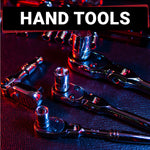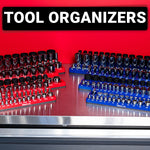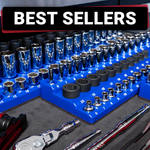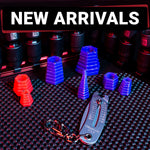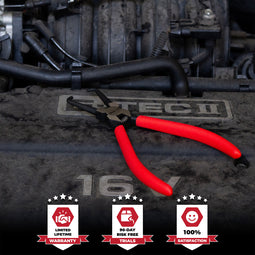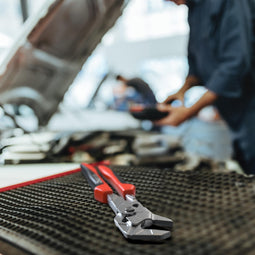Premium Professional-Grade Pliers
2 Product(s)
30-Minute Customer Service
Limited Lifetime Warranty
Whether you're a professional electrician, automotive technician, or dedicated DIY enthusiast, our pliers provide a secure grip and superior cutting performance. Built from high-grade steel with ergonomic handles, our assortment of pliers delivers comfortable daily use and the reliable performance professionals demand.
Whatever you choose, we guarantee:
- Professional quality: Our tools are engineered for mechanics, electricians, contractors, and serious DIYers who need reliable, long-lasting tools.
- Satisfaction guarantee: We provide high-quality, tool-truck-grade products at a fair price.
- 30-minute customer service: Talk to a real human for customer support within 30 business minutes or get your money back.
- 90-day risk-free return policy: Try any product completely risk-free for 90 days.
- Limited lifetime warranty: We protect you from manufacturing defects.
Our Professional Pliers Collection
Our pliers are forged from high-grade steel and engineered with ergonomic handles for comfortable, extended use.
10-Inch Pliers Wrench
The 10-inch pliers wrench features an innovative 10:1 leverage design. Built with flat, non-serrated jaws and dual-material handles, each pliers wrench delivers maximum power while protecting fasteners from damage.
The ergonomic design includes millimeter and inch markings for quick adjustments, with jaws that open up to 2 inches wide. Made in Germany from industrial-grade chrome vanadium steel, these pliers combine incredible 1000-lb grip strength with precision engineering for lasting performance.
Electrical Disconnect Pliers
The electrical disconnect pliers feature a precision-engineered hook design for electrical connectors. Built with industrial-grade chrome vanadium steel and PVC-dipped handles, each pair delivers one-handed operation while protecting delicate connectors from damage. The ergonomic grips reduce hand fatigue during extended use, while the compact design ensures easy access in confined spaces.
What Do You Use Pliers For?
Pliers are versatile tools used for gripping, bending, cutting, and manipulating materials. Professional mechanics use them for electrical work and fastener manipulation, while electricians rely on them for wire cutting and crimping.
Different plier types serve specific purposes: lineman's pliers for heavy wire cutting, needle-nose pliers for precise work in tight spaces, and combination pliers for general gripping and cutting tasks.
Why Do Electricians Use Pliers?
Electricians use pliers for wire manipulation, cutting, and crimping. Lineman's pliers can handle heavy gauge wires, needle-nose pliers can access tight spaces and manage smaller wires, and combination pliers aid in many electrical applications. High-quality insulated pliers also offer crucial protection when working with live circuits.
When Shouldn’t I Use Pliers?
Never use pliers on chrome or polished fasteners—choose a wrench instead. Avoid using pliers beyond their rated capacity or with live electrical wires without proper insulation. Don't substitute pliers for nuts and bolts work where a wrench or socket would be more appropriate, as this can damage fasteners and compromise safety.
Why Do I Need Pliers?
Every professional toolbox needs quality pliers for a wide range of tasks standard wrenches can't handle. They're essential for wire work, gripping irregular shapes, and accessing tight spaces. Professional mechanics and electricians often maintain several types of pliers to handle different applications—from precise connector work to heavy-duty cutting and gripping tasks.
What Grade Of Steel Do Olsa Pliers Use?
Our pliers feature industrial-grade chrome vanadium (Cr-V) steel, a quality steel chosen by professional technicians. This steel design stands up to wear and tear while maintaining excellent grip force. The durable design withstands harsh environments through its corrosion resistance; perfect for tough mechanical applications.
What Is the Jaw Opening Width of Olsa Pliers?
The flat, non-serrated jaws extend to a full 2-inch capacity and provide excellent grip on materials and fasteners. This adjustable design fits both metric and standard sizes, while the precision mechanics in the jaws protect surfaces. Professional technicians choose these all-purpose pliers for daily tasks.
How Many Types of Pliers Are There?
There are 40 main types of pliers, each designed for specific tasks:
- Slip joint pliers
- Tongue and groove pliers (channel locks)
- Combination pliers
- Diagonal cutting pliers
- End cutting pliers (end nippers)
- Lineman's pliers
- Flush cutters
- Wire strippers
- Crimping pliers
- Electrical pliers
- Vise-grip pliers (locking pliers)
- Needle nose pliers
- Long nose pliers
- Flat nose pliers
- Round nose pliers
- Pliers wrench
- Bent nose pliers
- Snap ring pliers (circlip pliers)
- Hose clamp pliers
- Grommet pliers
- Fencing pliers
- Battery pliers
- Water pump pliers
- Canvas pliers
- Piston ring pliers
- Mini pliers
- Electronics pliers
- Parallel jaw pliers
- Jeweler's pliers
- Split ring pliers
- Chain nose pliers
- Split nut pliers
- Bolt cutters
- Rebar tying pliers
- High-leverage pliers
- Brake spring pliers
- Exhaust hanger removal pliers
- Oil filter pliers
- CV boot clamp pliers
- Spark plug pliers
Each type of pliers serves a specific purpose, from general maintenance to specialized automotive, electrical, or precision work. For a deeper dive into pliers and their uses, explore our guide to different types of pliers.
How Do I Take Care of My Pliers?
To maintain your pliers in peak condition, follow these essential care tips:
- Clean after use: Wipe down your pliers with a clean cloth or tool wipes to remove dirt, metal shavings, and debris. This prevents buildup that can affect joint movement and gripping power.
- Oil the pivot point: Apply a drop of machine oil to the pivot point regularly. This keeps the pliers moving smoothly and prevents rust from forming in this crucial area.
- Protect the cutting edges: For pliers with cutting edges, avoid cutting hardened steel or materials beyond their capacity. This maintains the sharp cutting surface for longer use.
- Store properly: Keep pliers in dedicated tool organizers or tool rolls. This prevents them from banging against other hand tools, which can damage cutting edges and jaw surfaces.
- Check handles: Inspect grip coatings regularly for wear or damage. Compromised handles can affect both comfort and safety during use.
- Control moisture: Keep pliers in a dry environment to prevent rust. If they get wet, dry them thoroughly before storing them.
- Inspect regularly: Look for signs of wear, loose pivots, or damaged jaws. Replace any pliers showing significant wear to ensure safe operation.
With proper care, your pliers will provide reliable service for years. To keep your pliers organized and protected, check out our tool accessories collection, including our plier organizers, specifically the plier organizer rack, which holds up to 16 pliers and keeps them easily accessible whenever you need them.
How Do Dual-Component Handles Work?
Dual-material handles combine ergonomic shapes with soft grip technology. The comfort-grip design promotes user comfort during extended work periods to reduce hand strain while maintaining control. These handles give you a secure hold even in slippery conditions.
How Do the Electrical Disconnect Pliers Work For Electrical Tasks?
The precision-engineered hook design excels at precision wire manipulation and soft wires. The industrial-grade chrome vanadium steel construction and PVC-dipped handles let you work with electrical connectors using just one hand, while the compact size reaches tight spots.
Does the Curved Design of Pliers Matter?
The curved nose on our electrical disconnect pliers delivers one-handed control for electrical connectors. This specialized hook shape protects delicate components from damage while providing exact placement in confined spaces. The compact profile means you can work efficiently in cramped areas.
Do Olsa Pliers Have a Locking Mechanism?
Olsa Tools does not currently manufacture pliers with a locking mechanism. Our pliers and organizers focus on durability and precision. For complementary tools, Olsa's professional-grade products come with a lifetime warranty and dedication to quality.
What Are the Main Parts of Pliers?
Every pair of pliers consists of six essential components that work together:
- Handles: The plier handles are the grips you hold. They are usually rubberized for comfort and control.
- Pivot: A central joint connecting the handles to the jaws, enabling opening and closing movements.
- Jaws: The working end of the pliers that grips, bends, or cuts.
- Cutters: Sharp edges located near the pivot point, designed for cutting wires and small fasteners.
- Pipe grip: A curved section of the jaws with shallow serrations, specifically designed for gripping pipes and round objects.
- Teeth: Serrated jaw edges that enhance grip strength and prevent objects from slipping.
Customer Reviews
“They are great and well built. Been looking for pliers with smooth jaws. Easy to use and work very well.” —Gary L. (verified buyer of the 10-Inch Pliers Wrench, five-star review)
